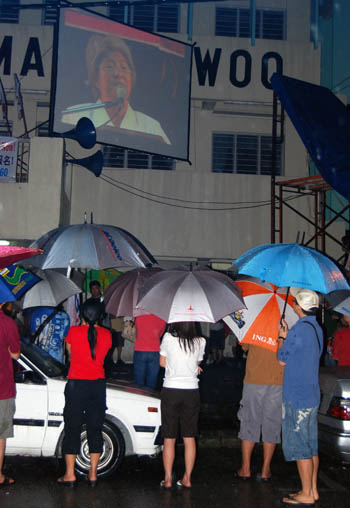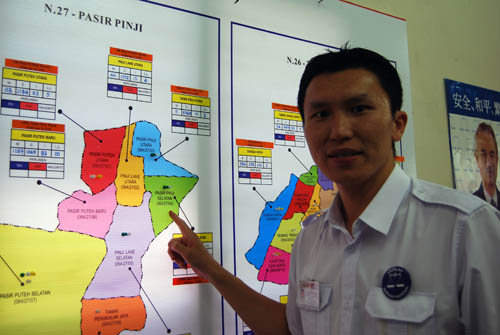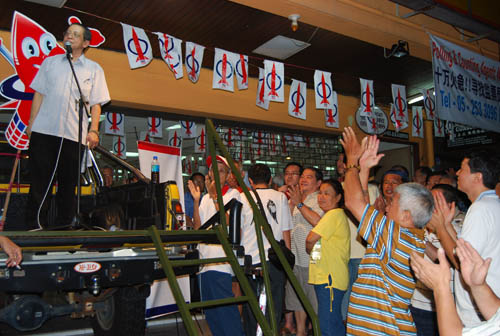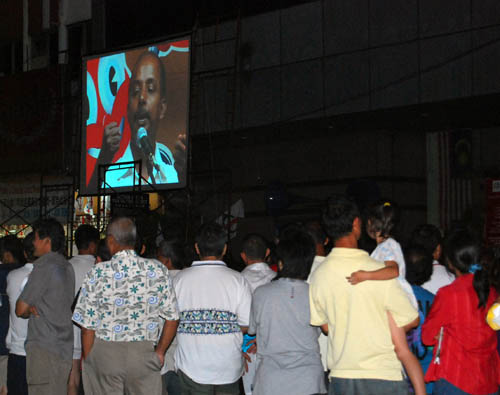By Cindy Tham
cindytham@malaysiavotes.com

IPOH: Like the rain that was pouring relentlessly, the number of people huddled under their umbrellas outside Wisma Chin Woo here on Feb 29 continued to grow into the night. They didn’t seem to mind the water splashing on their feet or the dampness in the air; their eyes were glued to the huge screen put up outside the building.
On the screen, DAP deputy secretary-general Chong Eng, the incumbent for the Bukit Mertajam (P45) parliamentary seat in Penang, said Malaysians should all be treated equally, regardless of race. “There are poor people among the Indians and the Chinese, too,” she said, rotating her points in Mandarin, Bahasa Malaysia and English.
The sound of clapping was audible through the sound system, coming from inside the building’s packed hall where Chong was delivering her ceramah [public speech].
The crowd outside, clinging onto their umbrellas, murmured and nodded at her reference to the existing poverty eradication policy.
Chong was one of the guest speakers that night. Later, when the main speaker, DAP leader Lim Kit Siang, took to the mike, the crowd gave him an enthusiastic greeting. Lim, who is defending the Ipoh Timor (P64) parliamentary seat, did not disappoint; his speech stressed on the need for reforms and checks and balances in government, and was peppered with gibes at Barisan Nasional (BN) ministers and politicians, which the crowd found entertaining.
But politicians know better than to assume that such response can be counted on to translate into votes on polling day on March 8.
The DAP is the only opposition party that won seats in Perak in the 2004 general election. While the BN won 21 parliamentary seats and 52 state seats, the DAP managed to clinch three parliamentary seats and seven state seats. The three parliamentary seats were won by Lim, DAP vice-chairman and Ipoh Barat (P65) incumbent M. Kulasegaran and Batu Gajah (P66) incumbent Fong Po Kuan.
That they won three of the six Kinta Valley parliamentary seats has been a thorn in the flesh for the Perak MCA, which has been tasked with capturing these seats back from the opposition. Ipoh is, after all, the capital of a BN-governed state. The other three parliamentary seats in the Kinta Valley – Gopeng, Kampar and Tambun – are deemed to be the BN’s stronghold.
The local underdog
Lim is being challenged by Dr Liew Mun Hon (BN), who is aware of the tough battle he is in for. In the 2004 general election, Lim garnered 28,851 votes, with a comfortable majority of 9,774 votes over Thong Fah Chong (BN). If the crowd sentiment at the ceramah that night and on other nights is anything to go by, it looks like Lim’s persona and message still has wide appeal among the local folk.
Liew, 32, is a relative greenhorn in politics; his ceramah, short and straightforward about the need for development, lacks the charisma and fiery oratory qualities that his opponent is known for. He joined the MCA only four years ago, while Lim, 67, has been navigating the political jungle for 42 years.

“I’m the underdog here,” Liew admitted. “But I have my own advantages. I’m from Ipoh. You need a local voice to bring your concerns to Parliament. Kit Siang doesn’t care about the locals and its aging population. He just wants to monitor the government,” he told MalaysiaVotes.com on March 2.
The local boy advantage was raised to point out the “outsider” that Lim is. Lim hails from Batu Pahat, Johor and has been a Member of Parliament (MP) for various constituencies since he was first elected MP for Kota Melaka in 1969.
Though born in Taiping, Liew attended SRJK Sam Tet and Poi Lam High School in Ipoh. He has been residing in Ipoh since he graduated from Australian and American universities with engineering degrees. “When I returned, a lot of my friends stayed overseas to work, and some in Kuala Lumpur,” he said. “I’m disappointed this is happening. What we need are job opportunities for the younger generation to come back to.”
He thinks the answer to the brain drain is development. Indeed, development has been the BN mantra in most polls. In this election, the Perak MCA and BN are wooing voters with their nine-point development plan, which aims to revive the flagging economy with a port in Lumut, an international airport in Ipoh, and better highways, education institutions, crime prevention measures and funding for businesses.
Part of the MCA campaign has also been to argue that Lim, labelled the missing MP who is hardly seen in Ipoh in the past four years, has done little to bring development or solve the local people’s problems.
Though still learning the ropes in politics, Liew has obviously picked up some tricks of the trade. On March 6, he held a press conference to accuse Lim of working with PAS in this election. “In Chinese-majority areas like Ipoh Timor, he would tell voters that the DAP has no connections whatsoever with PAS. But in Labis (Johor), which is a Malay-majority area, he does a different thing,” Liew was quoted as saying in The Star.
He was referring to a photo that appeared in the Chinese press, showing Lim and Dr Teo Eng Ching, the DAP parliamentary seat candidate for Labis, standing next to PAS supporters holding the party’s green and white flag.
In 1999, the DAP joined then Parti Keadilan Nasional and Parti Rakyat Malaysia (now both merged and known as Parti Keadilan Rakyat or PKR) and PAS to form the Barisan Alternatif. But the alliance with PAS, whose Islamic stand is a concern for the Chinese, turned out to be disastrous for the DAP. Two party stalwarts, Lim and Karpal Singh, lost that year. They made a comeback in 2004, after distancing the DAP from PAS.
The development story
The photo, showing Lim and Teo next to PAS supporters, was an opportunity too good to miss, although the MCA’s main campaign message is to promise development to revive the city. Is it good enough to win over the people in Ipoh, who appear to be a critical lot?
One businessman said he was fed up with seeing Ipoh fade from its wealthy tin mining heydays to a sleepy hollow left behind by development. “Ipoh is a dying town. We need development to revive it,” he said. Clearly bitter about the current state, he said, “What’s the use of having an opposition MP who makes a lot of noise in Parliament when it doesn’t do anything for Ipoh?”
Others, who spoke candidly on condition of anonymity, also lament the lack of development and the slow economy, but some maintain the opposition is not to blame for this. “Where’s the opposition going to get the funds for development? Besides, we pay taxes and assessment rates. These should go into development and local government work, like making sure the rubbish is cleared, street lamps are working,” said a carpenter. “If you blame the opposition for the lack of development in Ipoh, what is the excuse for the lack of development in the other BN-controlled constituencies in Perak? The BN, after all, controls the state government.”
One retired businessman said Ipoh already had the basic public infrastructure and amenities, although it could do with newer development to catch up with Kuala Lumpur. But, he said, what was more crucial for the nation at this stage was equality and the need to safeguard every community’s place in this nation. “The MCA’s hands are tied.”

Lim’s retort to accusations that he has not been doing his job in Ipoh Timor is to point to the BN-dominated state government and city hall. “There is a need to debunk the notion that the MP’s job is to deal with clogged drains and potholes. These are important concerns but they should be resolved by the state government and local government,” he told MalaysiaVotes.com after a DAP ceramah at Jalan Kampar on March 2. “If the people still have these problems, it just shows that the state government and local government are not doing their job.”
His critics have also questioned his absence from the constituency even when Parliament was not in session. Lim’s response: “The role of an MP is to speak up for the people, to voice their problems and aspirations, to speak up on nation-building. Not just during the Parliament session but daily.” He added that he has a service centre in Ipoh to attend to local concerns.
Kulasegaran has said in ceramahs and his blog that the MCA’s development plan sounded like an old election promise. He said MCA secretary-general and Perak MCA chairman Datuk Ong Ka Chuan had announced a similar plan in the 2004 election, when contesting against Fong for the Batu Gajah seat.
Political analyst Professor Shamsul Amri Baharuddin, who teaches social anthropology at Universiti Kebangsaan Malaysia, said urban voters would respond to the development mantra differently from their rural counterparts. He said the urban areas already enjoyed some degree of development and the voters’ would not be easily swayed by another development promise.
Keen contest
Like Lim, Kulasegaran and Fong appear to be popular among the ceramah spectators. But they themselves have acknowledged that this does not necessarily translate into votes.
Lim has said before he was worried about the 5,000 new voters, including 2,000 postal voters, in his constituency.

Kulasegaran is even more worried. He received 22,935 votes in 2004, scraping through with a slim margin of 598 votes. “About 1,000 old voters from Ipoh Barat have since been moved to the Batu Gajah constituency,” he told MalaysiaVotes.com on March 4. He said these were his supporters and read the move as an attempt to dilute his chances in this election. “The 2,321 postal voters are also not in my favour.”
On top of that, his contender is veteran MCA politician Datuk Yik Phooi Hong (BN), who is known as the Buntong Tiger and has been the Buntong state assemblyman for three terms. Buntong is one of the three state seats in the Ipoh Barat constituency; the other two are Bercham and Kepayang. This is not the first time that the two men are contesting against each other. In 1999, Yik beat Kulasegaran in the contest for Buntong, which has a large Indian community.
Fong is being challenged by newcomer Cheah Yoke Can (BN). In 2004, Fong garnered 28,662 votes, beating MCA stalwart Ong by 7,927 votes. Despite this and the loud cheers she receives during the ceramahs, she appears modest about her chances. “In my assessment, the DAP is an underdog this time in the Kinta Valley. I cannot even be sure if I would be able to successfully defend the Batu Gajah seat. We are trying hard. MCA is trying hard,” she was quoted as saying in a New Straits Times report.
![[L-R] BN Ipoh Barat parliamentary candidate Datuk Yik Phooi Hong and Kepayang state candidate Tan Chin Meng.](https://www.malaysiavotes.com/wp-content/uploads/2008/03/Yik.jpg)
In contrast, the report said all the three MCA candidates were confident they will be able to wrest the three seats from the DAP.
There are few fence sitters in Ipoh. “It’s a tough fight,” one pensioner in Ipoh Barat observed. “Yik, because he is in the BN, can bring development and funding. Kula can make a lot of noise in Parliament.”
Even so, he appears to have made up his mind. “We need to protect the rights of all Malaysians, including the minority groups and their freedom of religion.” But it’s nothing personal, he added. “I know both Yik and Kula. They are equally good. But one will have to be knocked out.”
The younger generation, however, may value the promise of pragmatic and material development on the local front, more so than the need for an elected representative to stand up for the people’s concerns at a national level.
[Note: Ipoh Timor has 96,647 voters; Chinese (81.5%), Malay (12.3%), Indian (5.0%) and Others (0.7%); three state seats: Canning (N25), Tebing Tinggi (N26) and Pasir Pinji (N27). Ipoh Barat has 68,773 voters; Chinese (65.05%), Indian (22%), Malay (13%) and Others (0.5%); three state seats: Bercham (N28), Kepayang (N29) and Buntong (N30). Batu Gajah (P66) has 77,313 voters; Chinese (78.1%), Indian (11.7%), Malay (10%) and Others (0.1%); three state seats: Jelapang (N31), Menglembu (N32) and Tronoh (N33).]